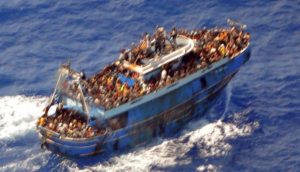New waves of migrants sparks backlash
Increasing numbers of migrants making dangerous, irregular journeys to Europe and the US have sparked a new wave of anti-immigrant policies and continuing political polarisation in wealthy destination countries, a raft of new data shows.
New asylum and immigration restrictions, and a sharp increase in anti-immigrant rhetoric from conservative governments have spiked as unprecedented, climate-driven disasters and economic crises have seen record numbers of refugees and asylum seekers set out on perilous journeys.
More than 2.9 million new asylum applications were submitted last year — more than any year since at least 2,000, according to the UN.
About 40 per cent of the new applications were made by people fleeing Latin America and the Caribbean, especially Cuba, Nicaragua and Venezuela.
There’s also been a dramatic surge in Europe, driven by migrants journeying across the Mediterranean Sea from Syria, northern Africa, Iraq, Turkey and elsewhere.
Europe, as a bloc, has been struggling to come to terms with this mass movement of people, not seen since the exodus of people from Iraq and Syria in 2015-16.
Tunisia in North Africa is now the launch pad for the majority of migrants who take risky journeys across the Mediterranean.
 Most head for Italy. So far this year more than 72,000 people have made the journey. That’s more than double the number who made it last year. The surge is made up largely of sub-Saharan Africans who are desperate to flee the continent.
Most head for Italy. So far this year more than 72,000 people have made the journey. That’s more than double the number who made it last year. The surge is made up largely of sub-Saharan Africans who are desperate to flee the continent.
But Italy has a new right-wing prime minister, Giorgia Meloni, who was elected with a promise of a naval blockade – her version of UK PM Rishi Sunak’s promise to “stop the boats” crossing the English Channel.
The EU is offering the prospect of up to $US2bn to Tunisia’s if the national president Kais Saied helps to stop the boats.
In Germany, the far-right AfD party is gaining ground.
A recent poll put them almost on equal footing with Chancellor Scholz’s governing Social Democrats.
Rosenheim, in the German state of Bavaria – a few miles from the Austrian border, is the first stop for many migrants coming to the country.
In 2015, thousands of Syrian refugees took their first step on German soil here. The country welcomed more than a million refugees in that crisis.
This is the area in which the AfD party won a local government position recently, the first time since the Nazi era that a far-right populist candidate had won an election there.
The Dutch government collapsed last week because the governing coalition could not agree on new restrictions on immigration and the once ultra-liberal Scandinavian countries have also adopted tough policies.
Denmark’s Social Democrat-led government passed a new law in 2021 allowing it to relocate asylum seekers to countries outside the EU while their cases are reviewed.












